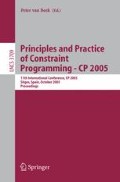Abstract
Constraints and preferences are ubiquitous in real-life. Moreover, preferences can be of many kinds: qualitative, quantitative, conditional, positive or negative, to name a few. Our ultimate goal is to define and study formalisms that can model problems with both constraints and many kind of preferences, possibly defined by several agents, and to develop tools to solve such problems efficiently.
In this paper we briefly report on recent work towards this goal.
Access this chapter
Tax calculation will be finalised at checkout
Purchases are for personal use only
Preview
Unable to display preview. Download preview PDF.
References
Bistarelli, S., Montanari, U., Rossi, F.: Semiring-based Constraint Solving and Optimization. Journal of the ACM 44(2), 201–236 (1997)
Boutilier, C., Brafman, R.I., Domshlak, C., Hoos, H.H., Poole, D.: CP-nets: A tool for representing and reasoning with conditional ceteris paribus preference statements. Journal of Artificial Intelligence Research 21, 135–191 (2004)
Boutilier, C., Brafman, R.I., Domshlak, C., Hoos, H.H., Poole, D.: Preference-based constraint optimization with CP-nets. Computational Intelligence 20, 137–157 (2004)
Domshlak, C., Rossi, F., Venable, K.B., Walsh, T.: Reasoning about soft constraints and conditional preferences: complexity results and approximation techniques. In: Proc. IJCAI 2003, pp. 215–220. Morgan Kaufmann, San Francisco (2003)
Kelly, J.S.: Arrow Impossibility Theorems. Academic Press, London (1978)
Pini, M.S., Rossi, F., Venable, K.B.: Possibility theory for reasoning about uncertain soft constraints. In: Godo, L. (ed.) ECSQARU 2005. LNCS (LNAI), vol. 3571, pp. 800–811. Springer, Heidelberg (2005)
Prestwich, S., Rossi, F., Venable, K.B., Walsh, T.: Constraint-based Preferential Optimization. In: Proc. AAAI 2005. Morgan Kaufmann, San Francisco (2005)
Rossi, F., Sperduti, A.: Acquiring both constraint and solution preferences in interactive constraint systems. Constraints 9(4) (2004)
Rossi, F., Venable, K.B., Walsh, T.: mCP Nets: Representing and Reasoning with Preferences of Multiple Agents. In: Proc. AAAI 2004. AAAI Press, Menlo Park (2004)
Rossi, F., Pini, M.S., Venable, K.B., Walsh, T.: Aggregating preferences cannot be fair. In: Proc. TARK X, Singapore, June 2005. ACM Digital Library (2005)
Rossi, F., Venable, K.B., Yorke-Smith, N.: Controllability of Soft Temporal Constraint Problems. In: Wallace, M. (ed.) CP 2004. LNCS, vol. 3258, pp. 588–603. Springer, Heidelberg (2004)
Author information
Authors and Affiliations
Editor information
Editors and Affiliations
Rights and permissions
Copyright information
© 2005 Springer-Verlag Berlin Heidelberg
About this paper
Cite this paper
Rossi, F. (2005). Preference Reasoning. In: van Beek, P. (eds) Principles and Practice of Constraint Programming - CP 2005. CP 2005. Lecture Notes in Computer Science, vol 3709. Springer, Berlin, Heidelberg. https://doi.org/10.1007/11564751_3
Download citation
DOI: https://doi.org/10.1007/11564751_3
Publisher Name: Springer, Berlin, Heidelberg
Print ISBN: 978-3-540-29238-8
Online ISBN: 978-3-540-32050-0
eBook Packages: Computer ScienceComputer Science (R0)

